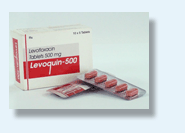Levaquin Product Description
Levaquin is antimicrobial drug with a strong antibacterial, anti-inflammatory action, with a wide action spectrum. Levaquin is effective against staphylococci, streptococci, Listeria, Haemophilus influenzae, Salmonella, Shigella, Clostridium, enterococci, Chlamydia, mycobacteria, mycoplasma, ureaplasma, and many other pathogens.
Levaquin can be used alone and in combination with other antibiotics, which have higher acid resistance and can suppress the action of microorganisms that deplete the active components Levaquin.
Levaquin belongs to the group of fluoroquinolones and has active bactericidal action. The medical action of Levaquin is based on violation of division and the formation of the genetic apparatus of microbes (their DNA), that leads to the death of microorganisms. Impairment of varying degrees occurs in the cytoplasm of the cell wall and it leads to a violation of fusion and fission of pathogens and their total destruction.
The therapeutic effect develops rather slowly and therefore the antibacterial therapy with levaquin is usually longer than using other antibiotics. The length of the treatment is compensated by the high efficiency of the drug and complete destruction of the target group of bacteria in the body of the patient.
Directions for the use
- Inflammation of the genitourinary system: prostatitis, urethritis, pyelonephritis, mycoplasmosis, cystitis, gonorrhea
- Infectious lesions of the skin and mucous membranes: furunculosis, osteomyelitis, erysipelas, infected wounds
- Infectious and inflammatory processes of the respiratory system and ENT - organs: lung inflammation, sore throat, bronchitis, tracheitis, sinusitis, otitis
- An infectious inflammation of the abdominal cavity
- Sepsis
Dosage and way of use
- Dosage of Levaquin is determined in individual way, after examining the clinical picture of the patient and examining its general condition. Depending on the type and severity of the infection dose can be adjusted during treatment.
- The standard initial dose for adults is 250-500 mg 1 time per day.
- Depending on the effectiveness of antibiotic therapy duration of treatment is from 7 to 14 days.
- In severe infectious processes the dose can be increased up to 750 mg or increase the duration of treatment for several days.
It is not recommended to take Levaquin more than 28 days for 1 course of treatment. If after this time, the patient feels an improvement in symptoms, you need to retake laboratory tests and specify the type of pathogen.
Precautions
- It is not recommended to take Levaquin in young people under 18 years of age.
- Contraindications to use are: idiosyncrasy fluoroquinolones or individual intolerance of active components of antibiotics, epilepsy, abnormal tendon damage,
- Patients that are receiving fluoroquinolones are not permitted to take Levaquin.
- Levaquin is contraindicated during pregnancy to reduce the risk of harm to the fetus.
- When taking this drug, during lactation breastfeeding should be discontinued.
Possible Side effects
Side effects are most likely to occur on the part of the digestive system and the central nervous system: dizziness, insomnia, bloating, stomach pain, fatigue, diarrhea, insomnia, hallucinations, and anxiety.
Side effects are not severe and carried quite soft. When Levaquin is applied with permissible doses, side effects are unlikely, but if there are some of them, then they pass quickly in a short period of time, without medical intervention.
Buy Levaquin no prescription
Buy Levaquin Online
